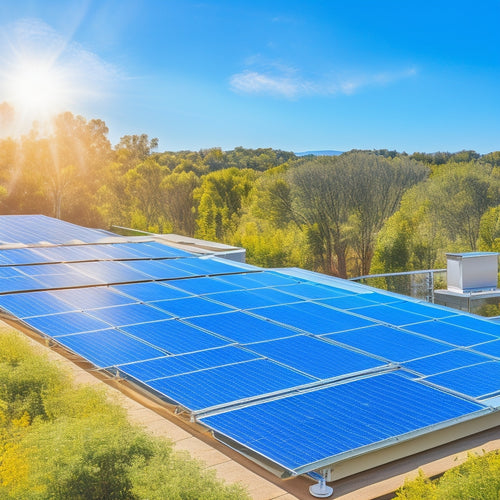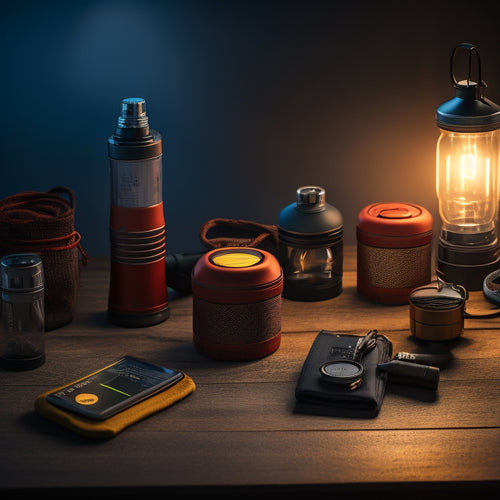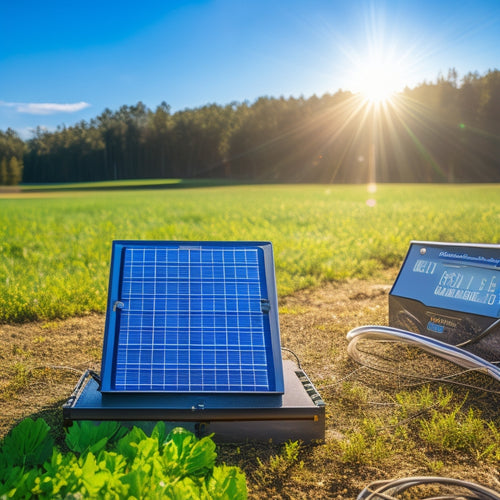
Top-Rated RV Generators for Full-Time RV Living
Share
For full-time RV living, top-rated generators like Honda and Champion offer reliable power options. Choose lightweight inverter generators for quiet operation and efficiency. Assess your energy needs first to determine the right wattage for your appliances, considering both starting and running watts. If you prefer sustainability, look into portable solar generators. They're eco-friendly and perfect for off-grid excursions. Don't forget about fuel efficiency and noise levels, which can greatly enhance your experience on the road. By exploring further, you can uncover even more perspectives to help you find the ideal generator for your RV lifestyle.
At a Glance
- Evaluate your energy needs for appliances to select the right generator size and type for full-time RV living.
- Lightweight inverter generators offer quiet operation and fuel efficiency, making them ideal for camping.
- Portable gas, solar, and dual fuel generators provide flexible and cost-effective power options for various RV lifestyles.
- Regular maintenance of generators extends their lifespan and enhances reliability during your travels.
- Understanding power output ratings ensures your generator can handle multiple devices without overload.
Reliable Power On-The-Go
When you're on the road, having reliable power is vital for your RV experience.
You'll want to assess your essential power requirements to guarantee you can run your appliances smoothly.
Portable solar generators are an excellent option for RV living, offering stable energy during outages and promoting self-sufficiency.
Fortunately, portable generator options are available to meet your needs, providing peace of mind wherever you go.
Essential Power Requirements
Reliable power is vital for any RV expedition, ensuring you stay connected and comfortable no matter where the road takes you. Understanding your fundamental power requirements will help you choose the right setup for your escapades.
Start by evaluating your energy needs. Consider everything from your appliances to electronics—each one draws a different amount of power.
Integrating a strong battery backup system is essential. This allows you to store energy for those times when you can't access an external power source. A well-sized battery bank will keep your fridge running, charge your devices, and power your lights, so you never feel off-grid.
Additionally, think about solar integration. Solar panels can capture the sun's energy, providing a sustainable and eco-friendly power source. They work wonders in conjunction with your battery backup, ensuring you always have energy available, even when parked in remote locations.
Portable Generator Options
Choosing the right generator can greatly enhance your RV experience by providing reliable power wherever you go. When considering portable generator options, you'll find several top generator brands offering models that suit your needs.
From lightweight inverter generators perfect for quiet camping to more powerful options for extended off-grid living, there's something for every lifestyle.
Before making a purchase, think about your power requirements. You'll want a generator that can handle your essential appliances without straining. Some popular brands, like Honda and Champion, offer excellent performance with great fuel efficiency.
To guarantee your generator remains in top shape, follow these maintenance tips: regularly check the oil level, clean or replace the air filter, and inspect the spark plug.
Keeping your generator clean and well-maintained will extend its lifespan and reliability, giving you peace of mind while exploring the open road.
Ultimately, investing in a good portable generator means you're not just gaining power; you're gaining freedom. You can venture into remote locations without sacrificing comfort, knowing you have the electricity you need at your fingertips.
Cost-Effective Energy Solution
When you're on the road, finding affordable power options can make a big difference for your budget.
Investing in a top-rated RV generator not only provides reliable energy but also leads to long-term savings by reducing reliance on costly fuel sources.
Equipped with high-efficiency solar panels, these generators enhance energy management and guarantee you have power when you need it most.
Let's investigate how choosing the right generator can keep your journeys both enjoyable and economical.
Affordable Power Options
Finding the right RV generator doesn't have to break the bank; there are plenty of affordable power options that deliver both performance and efficiency. By exploring alternatives like solar power and battery systems, you can enjoy the freedom of the open road without worrying about hefty expenses.
Here's a quick comparison of some budget-friendly options:
| Generator Type | Estimated Cost | Key Benefit |
|---|---|---|
| Portable Gas Generator | $300 - $600 | Easy to transport and use |
| Solar Power System | $500 - $1,200 | Sustainable and quiet |
| Battery Systems | $400 - $900 | Versatile and low maintenance |
| Inverter Generator | $500 - $1,000 | Fuel-efficient and reliable |
| Dual Fuel Generator | $400 - $800 | Flexibility in fuel sources |
With these options, you can find a power solution that fits your lifestyle and budget. Whether you opt for solar panels to utilize the sun's energy or a reliable generator for quick power access, you'll have the tools to keep your journeys powered up. Accept the freedom of affordable energy solutions and hit the road with confidence!
Long-Term Savings Benefits
Investing in an RV generator isn't just about immediate power needs; it can lead to significant long-term savings. By selecting a generator known for energy efficiency, you'll find that your fuel costs decrease over time. A generator that optimizes fuel consumption guarantees you're not constantly refilling, allowing you to travel further without the financial strain.
Moreover, adopting a few maintenance tips can extend your generator's lifespan, enhancing your investment. Regularly changing the oil, replacing air filters, and keeping the fuel system clean can prevent costly repairs down the road. A well-maintained generator runs more efficiently, leading to even lower energy costs.
Consider also the potential savings when camping in remote locations. Without the need for expensive RV park hookups, you'll enjoy the freedom to park almost anywhere while still powering your appliances. This flexibility not only saves you money but also enriches your journey.
Ultimately, choosing the right RV generator gives you both convenience and cost-effectiveness. With a focus on energy efficiency and practical maintenance, you can hit the road confidently, knowing you're making a sound financial decision for your full-time RV lifestyle.
Key Specifications Overview
When choosing an RV generator, understanding power output ratings and fuel efficiency metrics is essential.
These specifications directly impact how well your generator meets your energy needs while keeping costs manageable.
With the increasing popularity of off-grid solar power, many RV owners are now considering how these systems can complement their generator use, particularly for extended trips.
Let's break down what you should look for in these key areas to guarantee you make an informed decision.
Power Output Ratings
Understanding power output ratings is vital for selecting the right RV generator to meet your needs. When it comes to power types, you'll often see terms like starting watts and running watts. Starting watts refer to the initial surge of power needed to kickstart your appliances, while running watts indicate the continuous power required to keep them running. Knowing these figures helps you avoid overloading your generator.
Different generator brands offer various power output options, so it's important to match your generator's capabilities with your RV lifestyle. For instance, if you plan to run multiple devices at once—like air conditioning, microwaves, or even a coffee maker—opting for a generator with higher output ratings makes sense.
Consider your specific power requirements and choose a generator that not only meets them but also provides a bit of extra capacity for those unexpected needs. This approach guarantees you can enjoy your excursions without worrying about power shortages.
With the right knowledge about power output ratings, you'll be well-equipped to make an informed decision that supports your desire for freedom on the road.
Fuel Efficiency Metrics
How can you guarantee your RV generator runs efficiently without constantly refueling? Understanding fuel efficiency metrics is essential. Different fuel types can drastically affect how long you can run your generator between fill-ups. Gasoline, propane, and diesel each have unique efficiency ratings, so choosing the right one for your needs is imperative.
To help you evaluate your options, here's a quick overview:
| Fuel Type | Run Time per Gallon | Typical Usage (Wattage) |
|---|---|---|
| Gasoline | 6-8 hours | 2,000 - 3,500 watts |
| Propane | 8-10 hours | 2,000 - 4,000 watts |
| Diesel | 10-12 hours | 3,000 - 5,500 watts |
Regular generator maintenance also plays a significant role in maximizing fuel efficiency. Clean filters and regular oil changes can enhance performance and prolong run times. By understanding these metrics and keeping up with maintenance, you can enjoy extended journeys on the road without the hassle of frequent refueling. Choose wisely, and fuel your freedom!
Selecting Based on Power Output
When selecting an RV generator, it's essential to determine your power needs first.
Evaluating energy needs through an energy audit can help you analyze usage patterns and identify inefficiencies.
Think about the appliances and devices you'll be using, as this will guide you in choosing the right generator wattage options.
Understanding these factors will guarantee you have reliable power on your excursions.
Determining Your Power Needs
Before you hit the road, it's crucial to assess your power needs to guarantee your RV generator can handle everything you plan to run. Start by listing all the appliances and devices you'll use, such as refrigerators, air conditioners, and electronics. Each of these consumes a specific amount of power, which will help you determine the total wattage you'll need.
Next, consider the generator types available. Portable, inverter, and standby generators all have different power outputs and energy efficiency levels. Inverter generators, for instance, are known for their quiet operation and fuel efficiency, making them ideal for camping or off-grid excursions.
Meanwhile, more sturdy portable models can power multiple appliances simultaneously but may come with a trade-off in noise and weight.
Evaluate how often you'll be using these appliances and whether you'll need continuous power or just occasional bursts. This assessment will clarify your power needs and help you choose a generator that fits your lifestyle.
Generator Wattage Options
Choosing the right wattage for your RV generator is vital for guaranteeing you have enough power for all your needs. The wattage you require depends on the appliances you plan to use, so accurate wattage calculations are important.
Start by listing everything you want to power, like your fridge, lights, air conditioner, and electronics.
Different generator types, such as portable or inverter generators, come with varying wattage outputs. Portable generators typically offer higher surge wattage, making them suitable for heavy-duty appliances, while inverter generators provide clean power for sensitive electronics but usually have lower outputs.
Once you have your list, add up the running watts and consider the starting watts, especially for appliances like AC units that require more power to start.
A good rule of thumb is to add a 20% buffer to your total wattage calculation to guarantee you won't overload your generator during peak usage.
Quieter Operation Than Competitors
When you're camping or enjoying the outdoors, the last thing you want is a noisy generator disrupting your peaceful experience.
Many top-rated RV generators are designed to operate quietly, giving you a noticeable advantage over competitors.
Let's investigate how noise levels compare and why a quieter generator can enhance your RV excursions.
Noise Level Comparison
Many RV enthusiasts prioritize a quiet camping experience, and choosing the right generator can make all the difference. When you're out in nature, the last thing you want is a loud generator disrupting your peace. Thankfully, many top-rated RV generators focus on noise reduction, making them ideal for full-time living.
Generators equipped with advanced sound insulation technologies operate at a whisper, allowing you to enjoy the sounds of nature without interruption. Look for models that boast noise levels around 50 decibels or less, as that's comparable to a quiet conversation.
Some brands even offer eco-friendly modes that not only save fuel but also reduce noise during operation.
When comparing noise levels, it's crucial to check manufacturer specifications and user reviews. You'll want to find a generator that suits your unique lifestyle while keeping the peace for both you and your neighbors.
Frequently Asked Questions
What Fuel Types Are Best for RV Generators?
When choosing fuel types for your RV generator, consider propane benefits like cleaner emissions and easy storage, while diesel efficiency offers excellent mileage and power. Both can enhance your journeys and provide reliable energy on the road.
How Often Should I Service My RV Generator?
Did you know regular generator maintenance can extend its lifespan by up to 50%? You should service your RV generator every 100 hours or annually, whichever comes first, to guarantee peak performance and reliability during your travels.
Can I Run My Generator While Driving?
Yes, you can run your generator while driving, but consider generator noise and fuel efficiency. It's essential to balance your power needs with the potential for increased fuel consumption and noise levels during your trip.
What Safety Features Should I Look for in an RV Generator?
When you're out exploring, safety features in an RV generator are essential. Look for generator overload protection and carbon monoxide detection to keep your excursions worry-free, ensuring you enjoy every moment without compromise.
How Do I Properly Store My RV Generator?
To properly store your generator, follow generator maintenance tips and apply winterization procedures. Clean it thoroughly, drain the fuel, and cover it to protect against dust and moisture, ensuring it's ready for your next journey.
Explore More
As you prepare for your full-time RV expedition, imagine the hum of a top-rated generator quietly powering your essentials, keeping your lights on and your appliances running smoothly. Envision yourself effortlessly enjoying the great outdoors, all while knowing you've chosen a cost-effective energy solution customized to your needs. With the right generator, you won't just survive; you'll thrive in your mobile home. So, which generator will you trust to fuel your travels? The choice is yours, and the quest awaits!
Related Posts
-

What Types of Solar Energy Devices Are Available
You'll find several types of solar energy devices available today, each customized to different energy needs. Photovo...
-

Best Solar Powered Flashlights for Emergency Situations
When you're choosing the best solar-powered flashlights for emergency situations, focus on their brightness, battery ...
-

Choosing the Right Solar Power Charge Controller
Choosing the right solar power charge controller is crucial for maximizing energy efficiency and extending battery li...


